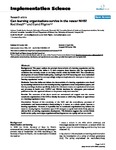Can learning organizations survive in the newer NHS?
| dc.contributor.author | Sheaff, Rod | |
| dc.contributor.author | Pilgrim, D | |
| dc.date.accessioned | 2017-08-16T16:34:40Z | |
| dc.date.available | 2017-08-16T16:34:40Z | |
| dc.date.issued | 2006-10-30 | |
| dc.identifier.issn | 1748-5908 | |
| dc.identifier.issn | 1748-5908 | |
| dc.identifier.other | 27 | |
| dc.identifier.uri | http://hdl.handle.net/10026.1/9838 | |
| dc.description.abstract |
Background: This paper outlines the principal characteristics of a learning organisation and the organisational features that define it. It then compares these features with the organisational conditions that currently obtain, or are being created, within the British NHS. The contradictory development of recent British health policy, resulting in the NHS becoming both more marketised and more bureaucratised has correspondingly ambiguous implications for attempts to implement a 'learning organisation' model. Methods: Texts that define and debate the characteristics of a learning organisation were found by snowballing references from the founding learning organisation books and published papers, and then by searching a database specifically devised for a literature review on organisational structures and processes in health care. COPAC and ABI-Info databases for subsequent peer-reviewed publications that also appeared relevant to the present study were searched. Results: The outcomes of the above search are summarised and mapped onto the current constituent organisations of the NHS to identify the extent to which they achieve or approximate to a learning organisation status. Conclusion: Because of the complexity of the NHS and the contradictory processes of marketisation and bureaucratisation characterising it, it cannot, as a whole system, become a learning organisation. However, it is possible that its constituent organisations may achieve this status to varying degrees. Constraints upon NHS managers to speak their minds freely place an ultimate limit on learning organisation development. This limitation suggests that current British health service policy encourages organisational learning-but not too openly and not too much. | |
| dc.format.extent | 1-11 | |
| dc.format.medium | Electronic | |
| dc.language | English | |
| dc.language.iso | English | |
| dc.publisher | BioMed Central | |
| dc.subject | Generic health relevance | |
| dc.title | Can learning organizations survive in the newer NHS? | |
| dc.type | journal-article | |
| dc.type | Article | |
| plymouth.author-url | http://www.plymouth.ac.uk/staff/wrsheaff | |
| plymouth.issue | 27 | |
| plymouth.volume | 1 | |
| plymouth.publisher-url | http://www.implementationscience.com/content/1/1/27 | |
| plymouth.publication-status | Published | |
| plymouth.journal | Implementation Science | |
| dc.identifier.doi | 10.1186/1748-5908-1-27 | |
| plymouth.organisational-group | /Plymouth | |
| plymouth.organisational-group | /Plymouth/Faculty of Health | |
| plymouth.organisational-group | /Plymouth/Faculty of Health/Peninsula Medical School | |
| plymouth.organisational-group | /Plymouth/REF 2021 Researchers by UoA | |
| plymouth.organisational-group | /Plymouth/REF 2021 Researchers by UoA/UoA20 Social Work and Social Policy | |
| plymouth.organisational-group | /Plymouth/Research Groups | |
| plymouth.organisational-group | /Plymouth/Research Groups/FoH - Community and Primary Care | |
| plymouth.organisational-group | /Plymouth/Research Groups/Institute of Health and Community | |
| plymouth.organisational-group | /Plymouth/Users by role | |
| plymouth.organisational-group | /Plymouth/Users by role/Academics | |
| plymouth.organisational-group | /Plymouth/Users by role/Researchers in ResearchFish submission | |
| dc.publisher.place | UK | |
| dcterms.dateAccepted | 2006-10-30 | |
| dc.identifier.eissn | 1748-5908 | |
| dc.rights.embargoperiod | No embargo | |
| rioxxterms.versionofrecord | 10.1186/1748-5908-1-27 | |
| rioxxterms.licenseref.uri | http://www.rioxx.net/licenses/all-rights-reserved | |
| rioxxterms.type | Journal Article/Review |


